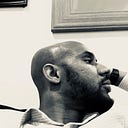Thinking Like a Human
On Martese Johnson
[Originally published on March 2015 in the Virginia Law Weekly]
Race. Racism. Racial Profiling. Police Brutality. There, I said it. I wanted to couch my message in a politically correct way but images of Martese Johnson’s bloodied head bashed against an all too familiar sidewalk under all too familiar circumstances just wouldn’t let me. If this article has made some of you uncomfortable so far, I’m doing my job.
In the beginning, it was hard to get fully behind the “Black Lives Matter” movement. Sure, I was well versed in ideologies of racism from an academic standpoint. Yes, I had experienced instances of what could have been perceived as racism. However, I always tried to give people and institutions the benefit of the doubt and forced myself to consider all sides of the arguments surrounding racism. When the Trayvon Martin verdict was handed down, I was in the throes of law school. I remember proudly but rather coldly telling my father, “Well, from a legal standpoint and based on the arguments presented, the Zimmerman verdict makes sense.” To me, “justice” had been served. What was the point of getting upset? Perhaps I would have liked the case to go another way but in my mind, Trayvon Martin was just a name in another fact pattern. Life had become a law school exam where I always knew there was another side and if I didn’t sympathize with it sufficiently, I might lose intellectual points. In a sense, I was comfortable and happy being a moderate. I became the “on the one hand and then on the other hand” guy. Additionally, I had an immense fear of being labeled that black guy that always used the proverbial race card.
However, after hearing more stories about unarmed black men being brutalized or killed, something didn’t feel right about my analytical approach. Though I didn’t agree with the Michael Brown grand jury decision, I also knew we had no video of what happened. I thought to myself “OK, maybe there was something that the grand jury knew that we didn’t.” Then came the great idea of body cameras. A-ha, problem solved! This still allowed me to stay in my “moderate and intellectual law student” comfort zone while keeping a close eye on injustice. On December 3, 2014, I witnessed a “no indictment” decision in the case of an unarmed Eric Garner after he was thrown to the ground by several officers, put in an illegal choke-hold and had his face smashed to the ground as he gasped “I can’t breathe” eleven times until he died. The entire incident was recorded. This wasn’t a fact pattern; this was someone’s life taken away unnecessarily right in front of my eyes. This was the absence of justice. At that point I couldn’t breathe. A new passion burned inside of me. I was no longer thinking like a lawyer, but thinking like a human; or well, a human who happens to be studying to become a lawyer.
This was my mindset when I heard about Martese Johnson’s brutal arrest. Before I knew Martese was not intoxicated nor did he use a fake ID nor was he acting belligerently (according to the bouncer outside of Trinity), I got the same human feeling I had when I heard about Eric Garner, Tamir Rice, John Crawford and most recently Jason Harrison (look him up). Could some overwhelming fact change my mind that this wasn’t a case of racial profiling? Sure. But given the pattern I had seen in the past few months and based off of my own experiences as a young black male in America, I sincerely doubted this situation escalated due to anything but prejudice. The more facts we obtain from this case, the more the argument cuts toward Martese being racially profiled before he was brutalized on the Corner.
Now I know what some of you are thinking. What about the 2013 incident with the Charlottesville ABC officers drawing weapons on a car full of white females who the officers believed had a case of beer in the car that turned out to be sparkling water? Isn’t this just an ABC problem and not a race problem? In that case, while the officers definitely overreacted, the girls weren’t hurt physically — even after the girls drove off without complying and brushed two officers with their vehicle in the process. Do you honestly think Martese would be here to tell you his story if his car brushed up against multiple officers with their weapons drawn? Yes, the Charlottesville ABC officers generally need to be controlled or reprimanded, but what happened to Martese last Wednesday morning has much broader implications about how black and brown men are viewed and treated in America. Apparently even the ones that are well spoken, on honor committees and go to prestigious universities are not exempt.
There will always be another side, but at some point, right is right and wrong is wrong. Here, racial profiling is wrong, hurtful and in some cases — deadly. Eliminating racial profiling from our societal power structure requires pressure on lawmakers and police departments to make necessary adjustments to ensure all people are treated with equality and fairness. It also requires a change of hearts and minds of the many moderates out there. We often forget that there were plenty of moderate people who could see both sides of the debate about segregation and women’s suffrage. In our lifetime, gay marriage was once much more divided than it is now. Yes, please think like a lawyer to critically examine arguments, including mine, but if you don’t get an urge to think like a human when you see a fellow UVA student being brutalized for reasons outside of his control, then maybe you’re part of the problem.
